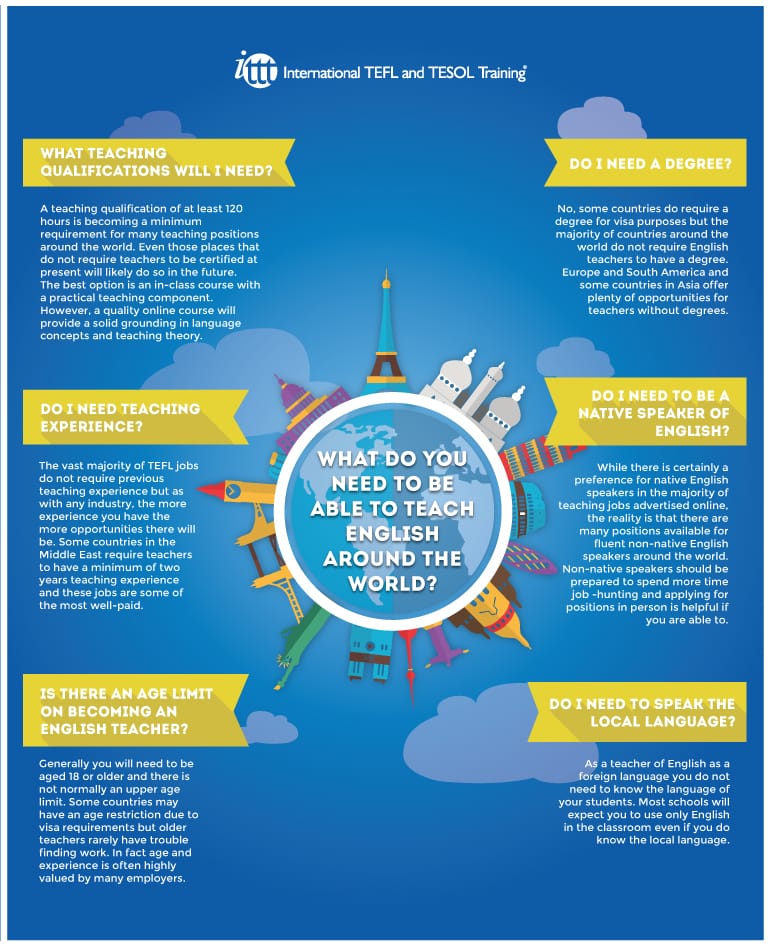ESL certification requirements for teachers?
To embark on teaching English abroad, what you truly require is a strong willingness to explore something new and a teaching qualification that attests to your completion of a certain level of teacher training. In this context, the widely recognized credential is a TESOL certificate. Such courses usually have minimal prerequisites, making them accessible to a wide range of individuals.
Table of Contents
What level of English is required to take a TESOL course?
What age limits are there with TESOL courses?
What educational background do I need to take a TESOL course?
Do English language teachers need to be bilingual?
Do qualified teachers still need to complete a TESOL course?
Do I need to know a lot about grammar to teach English abroad?
What level of English is required to take a TESOL course?
A fundamental requirement for enrolling in a TESOL certification course is a solid grasp of the English language. This criterion applies to both native English speakers and non-native speakers. As long as you possess a sound understanding of both written and spoken English you will be fine. The number of vacant English language teaching positions worldwide is vast, often surpassing the availability of qualified teachers in many regions. Thanks to this robust demand, numerous opportunities are awaiting suitable candidates. Non-native English speakers are encouraged to apply for teaching roles in most countries. Interestingly, at ITTT, we often find that non-native English speakers comprise a significant proportion of our TESOL course enrollees, often even outnumbering native speakers.
What age limits are there with TESOL courses?
The extensive global demand for TESOL-qualified teachers translates to abundant job opportunities across various age groups. To enroll in a TESOL certification course with ITTT, you must be at least 18 years old, and there are no upper age limits. Throughout the world, you will encounter teachers spanning a wide range of ages, occupying diverse classroom settings. From young students embarking on gap years to retirees seeking new avenues, teachers of all ages contribute to the vibrant landscape of English language education. The possibilities for TESOL-qualified teachers are truly boundless, irrespective of your age.

What educational background do I need to take a TESOL course?
At ITTT, we do not impose any specific prerequisites regarding your academic background. As long as you have a solid command of the English language and a genuine eagerness to learn effective teaching methods, you are more than welcome to enroll in our certification courses. Post-course, it is important to note that a degree is a requirement for obtaining a work permit in some countries. While this holds true for popular teaching destinations like China, Japan, and South Korea, numerous other countries maintain an open approach to individuals with various educational backgrounds. Due to this diversity, we maintain no specific qualification requirements for enrollment in our TESOL courses.
Do English language teachers need to be bilingual?
No, ESL teachers do not need to know any language other than English. Teaching English is possible without knowledge of your students' native language because our TESOL certification courses adhere to the immersion principle of language learning. In an ESL lesson, regardless of the diverse languages spoken by the teacher or the students, English is the exclusive language of communication. The immersion approach aims to replicate the environment that language learners would encounter if they were studying the language independently in an English-speaking country.
Do qualified teachers still need to complete a TESOL course?
Numerous certified teachers opt for a change in their career path by transitioning to teaching English as a foreign language, either domestically or abroad. While some may assume that their existing teaching credentials are sufficient, this is often not the case. Teaching English entails a distinct skill set and knowledge base that might differ from the qualifications held by traditional educators. While possessing a conventional teaching qualification can be advantageous during job applications, most employers still anticipate a TESOL qualification to ensure that candidates possess the specialized understanding necessary for this unique field of education.
Do I need to know a lot about grammar to teach English abroad?
Teaching English to non-native speakers necessitates a comprehensive grasp of English grammar. However, it is not obligatory to possess this understanding prior to enrolling in a TESOL course, as English grammar will constitute a substantial component of your training. Although pre-existing knowledge could be advantageous, most trainees commence their courses with only a foundational grasp of English grammar, which is progressively augmented throughout the course. By the culmination of your training, you should have assimilated adequate information to confidently instruct fundamental grammar topics. Nevertheless, a complete and thorough comprehension typically develops for many teachers after an extended duration of teaching regular classes.





